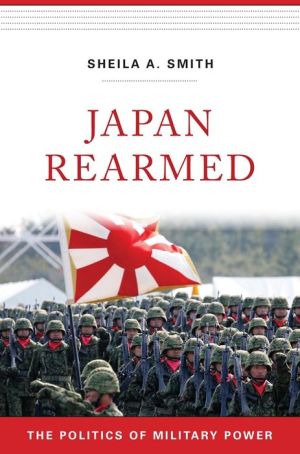Snippets
#Japan Rearmed: The Politics of Military Power by Sheila A. Smith

##Japan Rearmed: The Politics of Military Power
####Japan Rearmed: The Politics of Military Power Sheila A. Smith ebook
- Page: 304
- Format: pdf / epub
- ISBN: 9780674987647
- Publisher: Harvard
Japan Rearmed: The Politics of Military Power Sheila A. Smith epub
Japan’s U.S.–imposed postwar constitution renounced the use of offensive military force, but, as Sheila Smith shows, a nuclear North Korea and an increasingly assertive China have the Japanese rethinking that commitment, and their reliance on United States security. Japan has one of Asia’s most technologically advanced militaries and yet struggles to use its hard power as an instrument of national policy. The horrors of World War II continue to haunt policymakers in Tokyo, while China and South Korea remain wary of any military ambitions Japan may entertain. Yet a fundamental shift in East Asian geopolitics has forced Japan to rethink the commitment to pacifism it made during the U.S. occupation. It has increasingly flexed its muscles—deploying troops under UN auspices, participating in coercive sanctions, augmenting surveillance capabilities, and raising defense budgets. Article Nine of Japan’s constitution, drafted by U.S. authorities in 1946, claims that the Japanese people “forever renounce the use of force as a means of settling international disputes.” When Prime Minister Shinzo Abe broke this taboo by advocating revision of Article Nine, public outcry was surprisingly muted. The military, once feared as a security liability, now appears to be an indispensable asset, called upon with increasing frequency and given a seat at the policymaking table. In Japan Rearmed Sheila Smith argues that Japan is not only responding to increasing threats from North Korean missiles and Chinese maritime activities but also reevaluating its dependence on the United States. No longer convinced that they can rely on Americans to defend Japan, Tokyo’s political leaders are now confronting the possibility that they may need to prepare the nation’s military for war.
Japan Rearmed: The Politics of Military Power: Sheila A ...
Japan Rearmed: The Politics of Military Power [Sheila A. Smith] on Amazon.com. *FREE* shipping on qualifying offers. Japan’s U.S. – imposed postwar constitution renounced the use of offensive military force, but
CHINA’S RISE AND THE BALANCE OF INFLUENCE IN ASIA
China has surpassed Japan as Asia’s leader in military spending and in many dimensions of international trade. China is, moreover, emerging as a voice for East Asian economic, political and security interests.1 Beijing’s contribution to stabilizing regional markets during the
Corporations: Support: Japan Society
Contributions to Japan Society are deductible to the extent allowed by law. Certain goods and services provided in exchange for a donation may reduce the amount of a donor's charitable deduction. If you wish to make a donation but receive no benefits in return, please contact Japan Society.
Japan Rearmed: The Politics of Military Power - cfr.org
Japan Rearmed The Politics of Military Power Japan’s United States–imposed postwar constitution renounced the use of offensive military force, but, Sheila A. Smith shows, a nuclear North Korea
Sheila A. Smith - cfrd8-files.cfr.org
Japan's New Politics and the U.S.-Japan Alliance (Council on Foreign Relations, June 2014). She is also the author of the interactive website, “Constitutional Change in Japan.” Smith is a regular contributor to the CFR blog . Asia Unbound, and frequent contributor to major media outlets in the United States and Asia.
The Role of the Military in Presidential Politics
in partisan politics, including voting, had risen to the level of established custom.12 The military attitude was that the armed forces were “the neutral servant of the state,” loyal to “whoever held the reins of power under the constitutional system,” and as such “stood above the dirty business of pol-
Bibliography | Constitutional Change in Japan
Government Section, Supreme Commander of the Allied Powers. Political Reorientation of Japan: September 1945 to September 1948. Westport, CT: Greenwood Press, 1970.
Japan Rearmed: The Politics of Military Power ...
Modern Japan is not only responding to threats from North Korea and China but is also reevaluating its dependence on the United States, Sheila Smith shows. No longer convinced they can Japan Rearmed: The Politics of Military Power (9780674987647): Sheila A. Smith - BiblioVault
Read Book The Use of Force: Military Power and ...
military_ global power top10 pakistan forces- world_s army military air force navy 2013
Time to Let Japan Be a Regular Military Power | The ...
Time to Let Japan Be a Regular Military Power. However, the breakdown of the wartime alliance with the Soviet Union and creation of the People’s Republic of China caused Washington to flip-flop and favor a rearmed Japan. Japanese policymakers relied on creative constitutional interpretation to establish a “Self-Defense Force.” Still,
Assessing the Asia-Pacific Rebalance | Center for ...
As China’s power grows and its assertiveness in regional disputes increases, U.S. allies and partners continue to rely on the United States to help reinforce regional security. In this increasingly tense environment, it is critical that regional allies, partners, and competitors recognize and acknowledge that the United States is a Pacific power with the ability to carry out its rebalance strategy.
Comments (0)
You can clone a snippet to your computer for local editing. Learn more.
